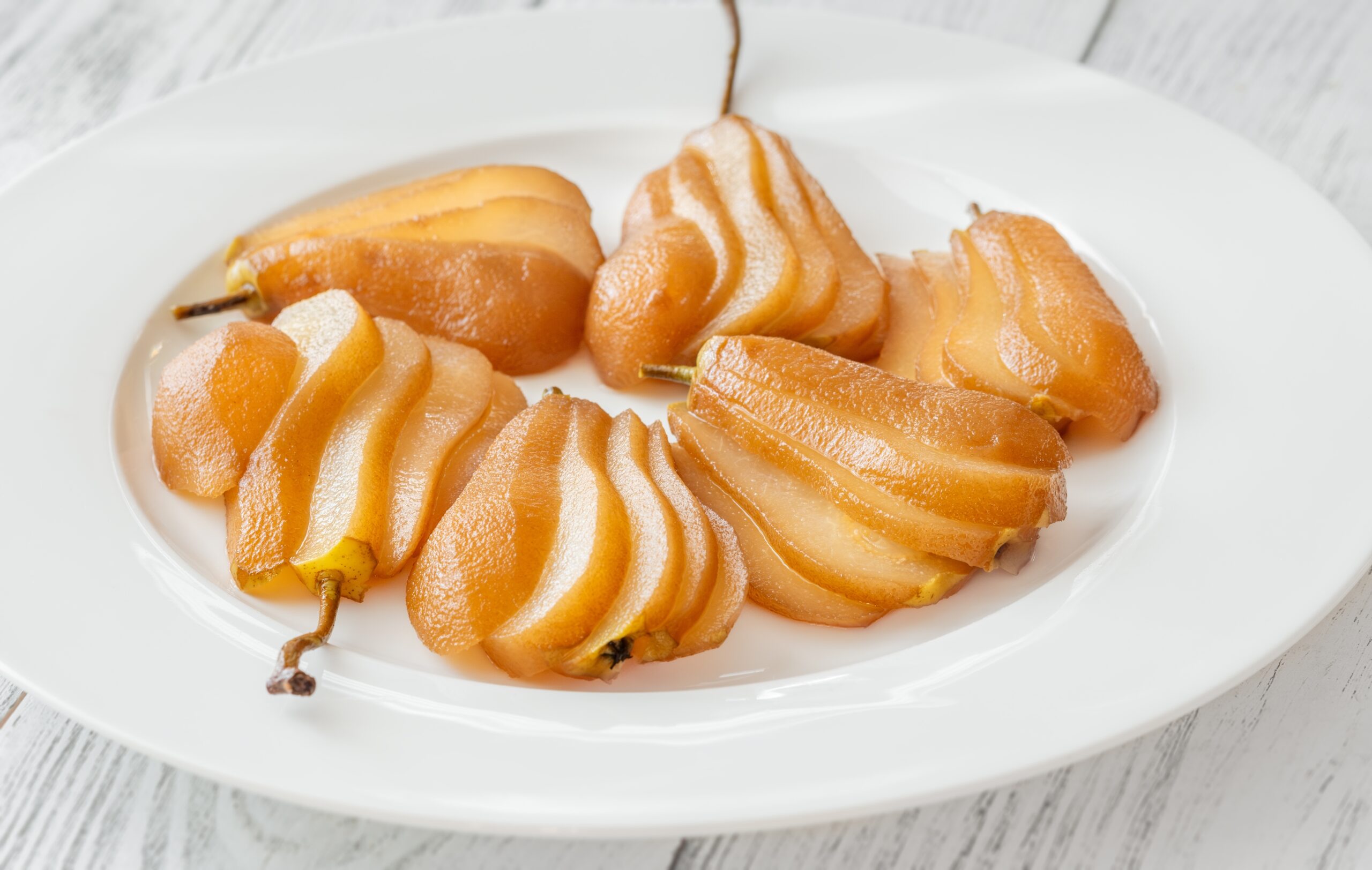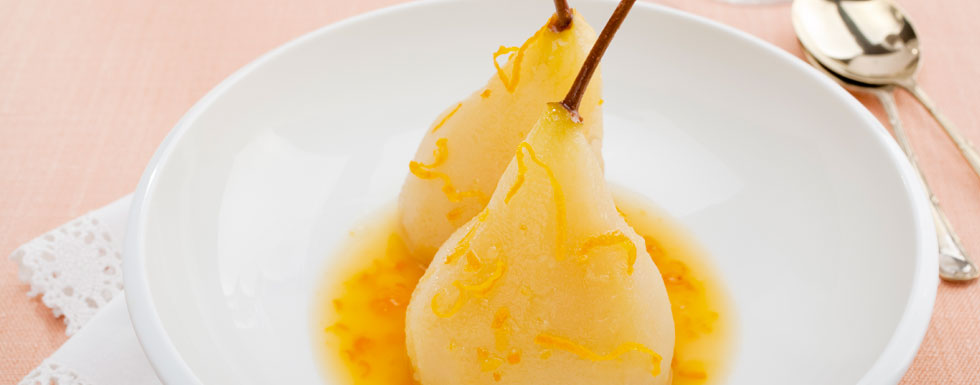

Ayurvedic cooking is about guiding principles rather than rules. For example, food should be light, easy to digest, and cooked foods are considered easier to digest than raw.
Eastern View: Heavier food is okay in winter, but during the summer it’s recommended to eat lighter. Ayurveda cooking uses spices intelligently to balance the doshas. It’s believed certain foods to not go well with others, and different sorts of foods are required at different times (ie: pregnancy and post illness).
This simple but elegant dessert makes a beautiful finish to any meal. Choose pears that have a firm flesh for cooking. Try Anjou, Bartlett and Bosc.
Pears are a soothing, cooling, and Kapha friendly fruit that calms the heart and relieves restlessness. Western naturopaths consider pears to be hypoallergenic, a safe choice for those with food sensitivities.
Their cold and expectorant qualities are used in Chinese medicine when heat conditions dry up fluids in the lungs. Their lubricating action also relieves cough, especially when the juice is combined with raw honey. Although pears quench thirst they are also a diuretic.
In ancient Greece, pears were used to treat nausea. They are laxative and a good source of fiber. Too many pears, however, will have an excess cooling effect on digestion, aggravating Vata and Kapha. Avoid eating pears late at night, or if you have acid reflux.
Western View: The Food and Nutrition Board of the National Institute of Medicine has developed an AI (Adequate Intake) guideline for fiber.They recommend that men under the age of 50 consume 38 grams per day and women under the age of 50 consume 25 grams per day. For adults over 50, the recommendation for men is 30 grams per day and 21 grams per day for women.
Many people in America do not get even 50 percent of their daily recommended amount.
The National Institute of Medicine based its recommendation on a review of the findings from several large studies. They found that diets with 14 grams of fiber for every 1,000 calories were associated with significant reductions in the risk of both coronary heart disease and type 2 diabetes.
The easiest way to increase fiber intake is to increase the consumption of fruits and vegetables. Just one medium-sized pear provides 6 grams of fiber, about 24 percent of the daily need for a woman under 50.
Diverticulitis is when bulging sacs in the lining of the large intestine (diverticulosis) become infected or inflamed. High fiber diets are thought to decrease the frequency of flare-ups of diverticulitis by absorbing water in the colon and making bowel movements easier to pass. Eating a healthful diet including plenty of fruit, vegetables, and fiber can reduce pressure and inflammation in the colon. Although the exact cause of diverticular disease is still unknown, it has repeatedly been associated with a low fiber diet.
Fruits and vegetables that are high in fiber help keep you feeling fuller for longer and are also low in calories. Increased fiber intake has been associated with enhanced weight loss for obese individuals.
Increased fiber intake has also been shown to lower cholesterol levels. A review of 67 separate controlled trials found that even a modest 10-gram per day increase in fiber intake reduced LDL (low-density lipoprotein or “bad” cholesterol) and total cholesterol.
Recent studies have shown that dietary fiber may even play a role in regulating the immune system and inflammation, and may have the potential to decrease the risk of inflammation-related conditions such as cardiovascular disease, diabetes, cancer, and obesity.
A high-fiber diet is associated with a lower risk of developing diabetes and more stable blood sugar levels in people with diabetes.
The fiber content in pears prevents constipation and promotes regularity for a healthy digestive tract. Also regular, adequate bowel movements are crucial for the daily excretion of toxins through the bile and stool. Pears are approximately 84 percent water, which helps keep stools soft and flush the digestive system of toxins.
Poached Pears with Sweet Orange and Date Glaze.
Ingredients:
Directions:
Peel each pear, leaving stalk and cut thin slice off base so it stands up. Place in sauce pan with inch of water and bring to simmer. Add dates, orange juice, zest, and syrup, and cinnamon, ginger and simmer until pears are tender (about 12 minutes). Remove ears and place on serving plates. Continue to simmer liquid in pan, stirring all the time until it thickens enough to spoon glaze over pears.
Garnish with coconut to serve.
Eating Ayurvedically makes you feel nourished and energized. An Ayurvedic diet is tailored to your individual body type and the specific imbalances you are working with at any given time. Foods that supplement your specific body type’s needs and digest easily create your menu. Watch as you eat less but feel more satisfied because what you are eating truly nourishes you. Since Ayurveda believes all disease begins in the digestive tract, food is your first medicine. By eating a healthy diet that’s ideal for your body, you experience optimal health.
If you would like to talk with me, I offer a complimentary consultation where we can chat about your health problems and goals.
In health,


The Holistic HIghway integrates traditional Western medical practices with Ayurveda medicine, creating a focus on prevention through nutrition, diet, and exercise; use of the latest genetic testing and other diagnostic techniques; and prescribed combinations of botanical medicines, supplements, therapeutic diets, detoxification programs, or stress-management techniques.

Integrative Health Expert | Ayurveda Practitioner | Author | Speaker
Kerry is a globally recognized leader in integrative medicine and the science of health known as Ayurveda. She is passionate about raising awareness of the need for a change in contemporary medicine that focuses on patient empowerment and a health-based (rather than disease-based) medical system.
Kerry is connected with The University of Pittsburgh Center for Integrative Medicine and remains a pioneer in the field of integrative medicine where she has developed a personalized system to manage chronic disorders by incorporating fundamental changes in diet, behavior, and stress while focusing on genetics.
This individualized program is so successful that many of her clients have achieved maximum healing and vitality after years of chronic problems!
More to Explore
Contact
Disclaimer
The sole purpose of all the website content is to educate and provide information about Integrative Health, Genetics and Ayurveda.This information is not intended for use in the diagnosis, treatment, cure. or prevention of any disease.
Stay Connected